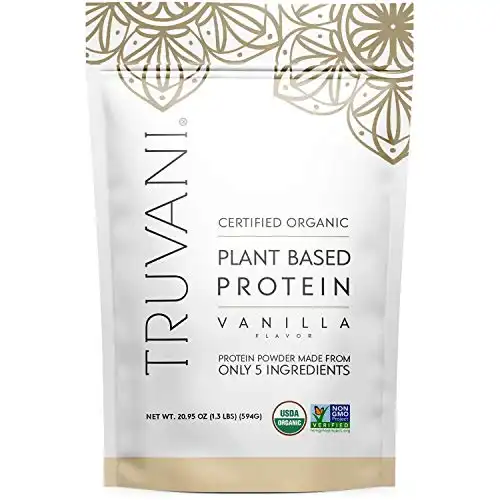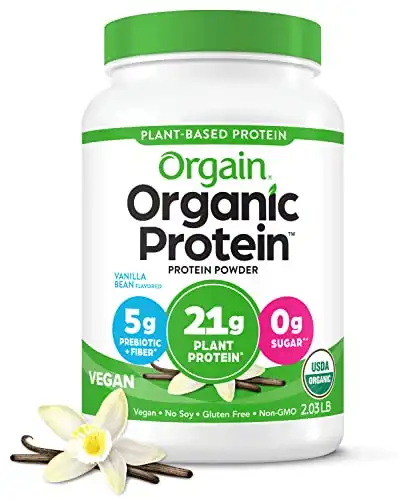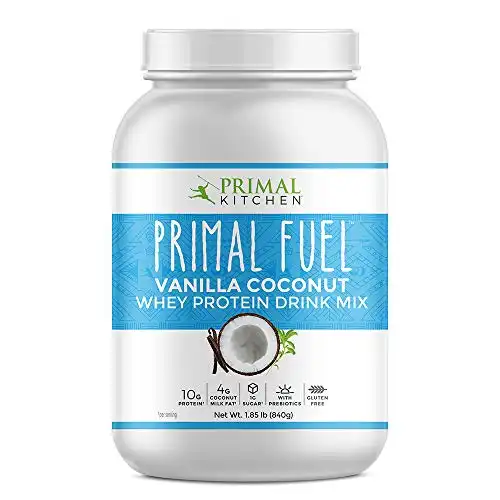This post contains affiliate links. Please see our disclosure policy.
As a certified personal trainer, I can attest to the vital role protein plays, especially for women in their mid-life years. I am constantly reminding midlife women to eat more protein, because:
- Many women tell me that they feel weaker and old
- Many women tell me they feel tired during their workouts (if they workout)
- Many women tell me they don’t like to eat meat
- Many women tell me they are just not eating as much
Protein is essential for women in midlife for several important reasons. As we age our nutritional needs change and protein becomes particularly crucial for various aspects of health.
Here are the 10 reasons why protein is important for women in this age group, and why you need more of it as you get older:

Save This Article To Read Later
Table of Contents
- 1. Muscle Mass Preservation
- 2. Metabolism Support
- 3. Bone Health
- 4. Hormonal Balance
- 5. Blood Sugar Regulation
- 6. Satiety and Weight Management
- 7. Muscle Recovery and Repair
- 8. Skin Health
- 9. Immune Function
- 10. Nutrient Absorption
- Recommended Amount of Protein for Women Post-Menopause
- The Best High-Protein Foods to Add to Your Diet
- Delicious Protein Recipe Inspiration
1. Muscle Mass Preservation
As we age, we naturally start to lose muscle mass, a process known as sarcopenia. Protein intake becomes critical to help preserve muscle mass, which is essential for maintaining strength, mobility, and overall functional independence.
Try my favorite strength training moves for women over 50 and the best mobility exercises for staying active paired with more protein to see the best results.
2. Metabolism Support
Protein has a higher thermic effect compared to carbohydrates and fats, meaning your body burns more calories digesting and metabolizing it. This can be particularly beneficial for women in mid-life who may experience a slowdown in metabolism.
In addition to protein, these are the top fat burning foods that can increase your metabolism.
3. Bone Health
Adequate protein intake is associated with better bone health. Since women are at a higher risk of osteoporosis as they age, ensuring sufficient protein intake can help support bone density and reduce the risk of fractures.
4. Hormonal Balance
Protein is crucial for hormone synthesis and regulation. Hormonal changes during menopause can affect metabolism and body composition, making protein intake even more important for maintaining hormonal balance.
See my additional tips for balancing hormones for weight loss.
5. Blood Sugar Regulation
Including protein in meals can help stabilize blood sugar levels, which is essential for managing energy levels, mood, and preventing insulin resistance.
If high blood sugar is something you struggling with, check out the foods that can help lower blood sugar naturally.
6. Satiety and Weight Management
Protein-rich foods are more filling and can help control appetite and reduce cravings, which can be beneficial for women navigating weight management challenges during mid-life.
You can also give my 25 sneaky weight loss tips that actually a work a try ; ).
7. Muscle Recovery and Repair
Whether engaging in resistance training or simply daily activities, protein is essential for muscle recovery and repair, supporting overall physical function and reducing the risk of injury.
8. Skin Health
Protein is essential for collagen synthesis, which helps maintain skin elasticity and firmness. Ensuring adequate protein intake can contribute to healthier skin as women age.
You can also give my favorite anti-aging skincare a try!
9. Immune Function
Protein plays a role in immune function, helping to produce antibodies and supporting the body’s defense against infections and illnesses, which becomes increasingly important as we age.
Browse these immunity guides for extra support:
10. Nutrient Absorption
Protein facilitates the absorption of essential nutrients, including vitamins and minerals, ensuring optimal nutrient utilization for overall health and well-being.
Incorporating protein-rich foods such as lean meats, poultry, fish, eggs, dairy, legumes, nuts, and seeds into daily meals and snacks can help women in mid-life meet their protein needs and reap the numerous benefits it offers for health and vitality.
Recommended Amount of Protein for Women Post-Menopause
The recommended amount of protein for women in their post-menopausal years varies depending on factors such as activity level, muscle mass, overall health, and individual goals. However, as a general guideline, the Recommended Dietary Allowance (RDA) for protein for adult women is 0.36 grams of protein per pound of body weight per day.
For women in mid-life and beyond, some experts like myself suggest slightly higher protein intake to support muscle preservation, bone health, and overall well-being. Recommendations may range from .5 to 1 gram of protein per pound of body weight per day for older adults.
For example, a woman who weighs 150 pounds, may aim for approximately 54 to 75 grams of protein per day, while a more active woman with the same weight may target closer to 75 to 150 grams of protein daily.
It’s essential for women to listen to their bodies, monitor their nutritional intake, and adjust their protein intake based on their individual needs, activity levels, and any specific health considerations they may have.
Consulting with a healthcare provider or a registered dietitian can provide personalized guidance on protein intake and overall nutrition for women in their post-menopausal years.
The Best High-Protein Foods to Add to Your Diet
Now that you know how important protein is (especially for women as they age), it’s time to add it to your weekly nutrition plan!
I recommend checking out this guide to high protein food options for inspiration. You can also add more protein to your diet using one of my favorite protein powders.
Once you start adding the right amount of protein to your diet, you may be surprised how great you feel!
| Product Image | Product Name | Primary Button |
|---|---|---|
Delicious Protein Recipe Inspiration
Give my favorite protein-packed recipes a try to start hitting your optimal levels each day.






Yes, 1 gram of protein per kg of your body weight is essential. Also, do not cut off your carbs intake completely.